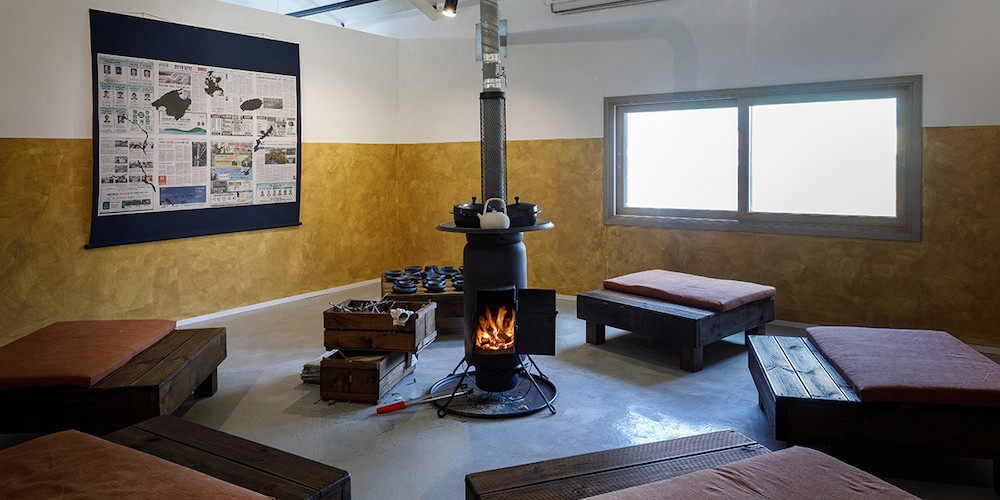Alumna Yujin Lee ’15 and Professor Rirkrit Tiravanija Participate in Jeju Biennale
Since 2019, Visual Arts alumna Yujin Lee ’15 has facilitated an independent artist residency called Next Door to the Museum Jeju (ND to the M), on Jeju Island, South Korea. This year, Lee invited Professor of Professional Practice Rirkrit Tiravanija to participate as a resident artist ahead of the Jeju Biennale, which runs from November 16, 2022 to February 12, 2023.
The residency format offers artists the chance to develop work over a six to eight week period in a space that Lee envisions as “an intimate collective laboratory where the boundaries of art and life are muddled and the art that results from it are too obscure to belong anywhere.” For Tiravanija, the residency culminated in a new work, Untitled 2022 (submit to the black compost), which was presented at Next Door to the Museum Jeju, as part of the Biennale.
Jeju Biennale Artistic Director Park Nam-hee “gathered fifty-five artists and teams from sixteen countries to present a total of 165 works of various genres” centered around the title Flowing Moon, Embracing Land, the Korean contemporary art newspaper K-ArtNow reports.
In a similar vein to the Okayama Art Summit (hosted in Japan and directed this year by Tiravanja) which posed the question of whether we, as individuals and collective global citizens, dream under the same sky, the Jeju Biennale continues that conversation by drawing focus to the inherently relational aspect of being alive together on a shared planet.
For Untitled 2022 (submit to the black compost), Tiravanija, who is known for creating participatory and site-specific art installations, drew on Edouard Glissant’s instructional poems to facilitate an interactive art experience during which participants are brought into relationship with one another as well as with particular moments in Tiravanija’s encounters on Jeju island. For instance, on one of the walls in Next Door to the Museum Jeju, participants encounter a large map of Jeju island populated with the places and the people who directly impacted the edible and tangible elements of Untitled 2022 (submit to the black compost)—the green curry, local tea, and ceramics which Tiravanija made during his time at the residency, and which “were fired by a Jeju-born ceramicist (Kang Seungchul, who is also a participating artist of the biennale) in the traditional Jeju Onggi (ceramic) kiln,” said Lee.
Upon Tiravanija’s departure from the residency, plans were left for an hour-long interactive experience to be conducted with each group of five visitors attending Next Door to the Museum Jeju on an RSVP basis. The visitors are welcomed by Lee, who then guides them through the site of the installation, which includes private quarters where “Glissant's 1969 poem ‘Do It’ is written on the wall, translated into Korean,” said Lee. Participants may paint a portion of the poem—“submit to the black compost”—in Korean script on t-shirts or fabric they bring. Even here, the interactive component of Untitled 2022 (submit to the black compost) gestures toward the inter-relational nature of making and experiencing art, for the natural paint used in the silkscreen printing process is made by Lee from locally sourced Jeju clay.
“Here, the audience comes to understand where the title "submit to the black compost" came from and how it reverberates in Professor Tiravanija's work,” Lee explains. The ecological and communal ethos inherent in the installation’s experience echoes the thematic focus for this third rendition of the Jeju Biennale, Flowing Moon, Embracing Land, which, K-ArtNow points out, “captures the properties of time and change in nature” and extends in earnest towards the “lively but humble relationships among the members of nature,” be they human, animal, or plantlife.
Jeju Biennale 2023 Images
The wood-fire stove is specially made out of refurbished materials created in collaboration with local Jeju sculptor Doil
Visitors read the Korean translation of Edouard Glissant's 1969 poem, "Do It," from which Tiravanija's work draws its title, 'Submit to the black compost.'
Visitors participate in silkscreening the Korean translation of the text "Submit to the black compost" onto their t-shirt with handmade Jeju clay paint
Visitors participate in silkscreening the Korean translation of the text "Submit to the black compost" onto their t-shirt with handmade Jeju clay paint
Serving green curry over rice
Serving Jeju grown sweet flag tea
